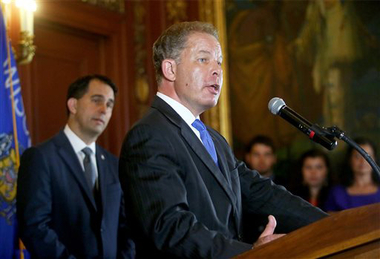Gov. Scott Walker appoints Kelly to Wisconsin Supreme Court

Madison, Wis. (AP) — Gov. Scott Walker appointed conservative attorney Dan Kelly to the Wisconsin Supreme Court on Friday, choosing a lawyer who has helped defend some of the governor's most contentious proposals and believes same-sex marriage robs the institution of meaning and affirmative action is akin to slavery.
Kelly will replace retiring Justice David Prosser, a member of the seven-justice court's five-person conservative majority. His appointment won't change the court's ideological tilt. He'll almost certainly be seen as succeeding Prosser as the fifth member of the majority.
Walker spokesman Tom Evenson told The Associated Press that the governor chose the 52-year-old Kelly, who holds a bachelor's degree in political science and Spanish from Carrol College and a law degree from the Regent University School of Law in Virginia.
Kelly has no judicial experience. He currently owns the Rogahn Kelly LLC law firm and sits on the litigation advisory board for the Wisconsin Institute for Law and Liberty. The conservative group has fought against lawsuits challenging Walker's signature law stripping public workers of nearly all their union rights and sided with Walker in a lawsuit to end a secret John Doe investigation into his 2012 recall campaign and conservative groups that support him. The probe ended after the state Supreme Court ruled nothing illegal occurred.
Kelly also successfully defended Wisconsin Republicans' 2011 legislative redistricting plan in a federal lawsuit alleging the new maps denied voters their rights. He was Prosser's co-counsel during the justice's election recount in 2011 and advised Justice Rebecca Bradley, another Walker appointee to the high court, during her 2016 election campaign.
Walker said during a news conference Prosser and Justice Shirley Abrahamson both lacked judicial experience before they got on the high court. He said Kelly passed his three tests for judicial appointees: he has integrity, he understands the law and he understands a judge's job is to uphold only the state and federal constitutions.
"I don't want an activist from the left or from the right," the governor said.
In his application materials for Prosser's position, Kelly wrote that he wants to be a justice so he can help preserve the rule of law, warning "no end of mischief" ensues when judicial activists develop new laws through their rulings.
He went on to expound at length on gay marriage in an essay contrasting justice with fairness, saying the U.S. Supreme Court's decision to legalize the practice "will eventually rob the institution of marriage of any discernible meaning."
"In the name of fairness, we will, in time, recognize other nontraditional arrangements as 'marriages,' and you will — coerced by law if necessary — dignify them too," he wrote. "Finally, when marriage eventually means anything imaginable, we will find it means nothing at all. All because of an unruly fairness that aspired to the office of justice itself."
He also delved into affirmative action, writing that the practice forces employers to hire people society wants them to hire and is a derivative of slavery.
"Affirmative action and slavery differ, obviously, in significant ways. But it's more a question of degree than principle, for they both spring from the same taproot," Kelly wrote. "Neither can exist without the foundational principle that it is acceptable to force someone into an unwanted economic relationship. Morally, and as a matter of law, they are the same."
Asked by reporters during the news conference to explain the writings, Kelly declined to comment. He said he didn't believe it was appropriate for a justice to talk about his or her personal philosophy. He stressed, however, that his beliefs will take a back seat to the law.
"The role of the courts is separate and apart from our roles as individuals in our society," Kelly said. "The oath that I will take will guarantee to you that my personal and political beliefs and political philosophy will have no impact whatsoever."
The governor wouldn't allow Kelly to answer any follow-up questions on the writing, saying Kelly had explained himself.
State Rep. Dana Wachs, the ranking Democrat on the Assembly judiciary committee, issued a statement questioning Kelly's lack of judicial experience.
"While it's unsurprising to me that Governor Walker would pick a conservative to fill this seat, what is surprising is picking such a combative, divisive and polarizing figure," Wachs said. "Wisconsin citizens want a justice they can trust to apply the law equally and without prejudice. Dane Kelly most certainly does not inspire confidence in this regard."
Kelly's appointment marks Walker's second selection to the state Supreme Court. His previous appointee, Bradley, won a full 10-year term on the court in April. Kelly will face election for a full 10-year term in 2020. Appointees must stand for election as soon as possible but under state law only one incumbent justice can run for re-election each year. Justice Annette Ziegler is up in 2017, Michael Gableman in 2018 and Abrahamson in 2019.
Walker chose Kelly over two other finalists, state appellate judges Mark Gundrum and Thomas Hruz.
Todd Richmond, Associated Press
Copyright 2016 The Associated Press. All rights reserved. This material may not be published, broadcast, rewritten or redistributed.
The Gayly - 7/23/2016 @ 5:04 p.m. CDT.





